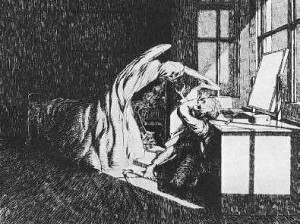The British national tradition of Christmas ghost stories is something of which I was uttely ignorant until one December a couple of years ago, when a friend introduced me to the work of M. R. James. Widely regarded as being one of the finest writers of ghost stories in the English language, James would hold small gatherings every Christmas Eve in his study at King’s College,Cambridge, where he was a Mediaeval scholar and provost from 1905 to 1918. In this presumably warm and comfortable setting, James’ stories, read aloud by the author, would regularly induce a chill that no amount of brandy could banish.
Although his academic work was much celebrated, it was for these ghost stories that James would become famous, and even reading them nearly a century after they were first written it’s not difficult to see why. Eschewing cheap scares and obvious gore, James’ tales have an incredible sense of atmosphere, something which is far rarer and more valuable in the telling of an effective ghost story. The most gruesome elements are often merely implied by the author, leaving them instead for the mind of the reader to fully envisage. This use of suggestion, coupled with an inescapable, creeping sense of dread characterised much of James’ writing, and it comes as no surprise to learn that H.P. Lovecraft was known to be an admirer of his work.
But frightening though they frequently are, James’ tales still seem imbued with an almost pastoral warmth, mainly through his choice of setting. Most of his stories are framed as real-life accounts related to the author second hand, with the protagonist usually a fellow academic visiting a country estate, abbey or rustic lodging house, only to discover that the pleasant veneer of their surroundings conceals something unexplainable and terrifying. This jarring juxaposition of such quaint and idyllic locations with shocking supernatural events works particularly well in creating an unsettling reading experience. James was in fact considered somewhat revolutionary in his day for this choice of setting, as it marked a departure from the gothic style that had characterised the work of many of his predeccesors. He enjoyed using this more realistic approach, he said, as it was easier to make the reader believe that their own humdrum existence was only one wrong turn away from a waking nightmare.
It’s certainly difficult to choose a personal favourite from amongst James’ many wonderful creations, but the three that stick in my mind most vividly are the demonic occupant of Number 13, the sinister “black pilgrimage” of Count Magnus and the cautionary fable of Oh, Whistle and I’ll Come to You, My Lad. The latter has been adapted twice for television by the BBC; first as a surreal and disturbing short film in 1968 (which is now sadly unavailable), and more recently as a much inferior modern reimagining in 2010. All of these stories capture the essence of James’ writing, steeped as they are in the sort of atmosphere he loved to conjure up in aCambridge study every Christmas Eve. If you’re looking for chills of a different kind this winter, the ghostly tales of M. R. James will remind you just how good a scary story can be.
Jim Taylor, Senior Bookseller, Waterstone’s Edinburgh Cameron Toll

